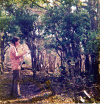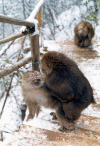Monkey business: A girl's once strange dream
- PMID: 35925423
- PMCID: PMC9362339
- DOI: 10.1007/s10329-022-01000-5
Monkey business: A girl's once strange dream
Abstract
For close to 50 years, my research has focused on social relationships and social structure, particularly in macaques, and has been marked by a gradual broadening of scope. Supported by open-minded parents, I followed a once unconventional path into field primatology largely by ignoring distinct gender-based ideas about appropriate occupations for women that were prevalent when I was a child. Later, as Robert Hinde's PhD advisee, I benefited enormously from his mentoring and from the transformative experience he provided. I began by examining infant social development in free-ranging rhesus monkeys and the integration of infants into the kinship and dominance structures of their groups. I gradually branched out to look at (1) kinship and dominance in additional age classes and macaque species, (2) additional aspects of social structure (reciprocity, agonistic support, tolerance, cooperation, conflict management), (3) mechanisms and organizing principles (e.g., attraction to kin and high rank, intergenerational transmission, demography, reciprocity, social style, time constraints) and (4) evolutionary underpinnings of social relationships and structure (e.g., parental investment, kin selection, socioecology, phylogeny, biological markets). For much of this journey, I have been accompanied by talented PhD students who have enriched my experience and whom I am now proud to call colleagues and friends. It is gratifying to realize that my career choice is no longer considered as unconventional as it once was.
Keywords: Macaca mulatta; Macaca thibetana; Macaques; Social development; Social relationships; Social structure.
© 2022. The Author(s), under exclusive licence to Japan Monkey Centre.
Figures












References
-
- Altmann J. Observational study of behavior: sampling methods. Behav. 1974;49:227–265. - PubMed
-
- Altmann J. Infant independence in yellow baboons. In: Burghardt GM, Bekoff M, editors. The development of behavior: comparative and evolutionary aspects. New York: Garland Press; 1978. pp. 253–277.
-
- Altmann J. Baboon mothers and infants. Cambridge: Harvard University Press; 1980.
-
- Altmann J, Altmann SA. Demographic constraints on behavior and social organization. In: Bernstein I, Smith EO, editors. Primate ecology and human evolution. New York: Garland Press; 1979. pp. 47–64.
-
- Balasubramaniam KN, Berman CM. Grooming interchange for resource tolerance: biological markets principles within a group of free-ranging rhesus macaques. Behaviour. 2017;154:145–1176. doi: 10.1163/1568539X-00003462. - DOI
Publication types
MeSH terms
LinkOut - more resources
Full Text Sources
Miscellaneous

